Eager to learn more about the micro-SaaS industry?
Micro-SaaS has become popular among entrepreneurs and developers who want to build their own software business.
And the fact that the SaaS market is predicted to grow will definitely attract more aspiring micro-SaaS entrepreneurs to join the trend.
So, if you plan to develop your own start-up software, now is the perfect chance!
To help you take action, I’ll share my five favorite micro-SaaS eBooks perfect for aspiring founders.
Keep reading if you’re ready to learn how these eBooks can help you build a profitable micro-SaaS business.
1. Building Micro-SaaS Businesses by Tyler Tringas
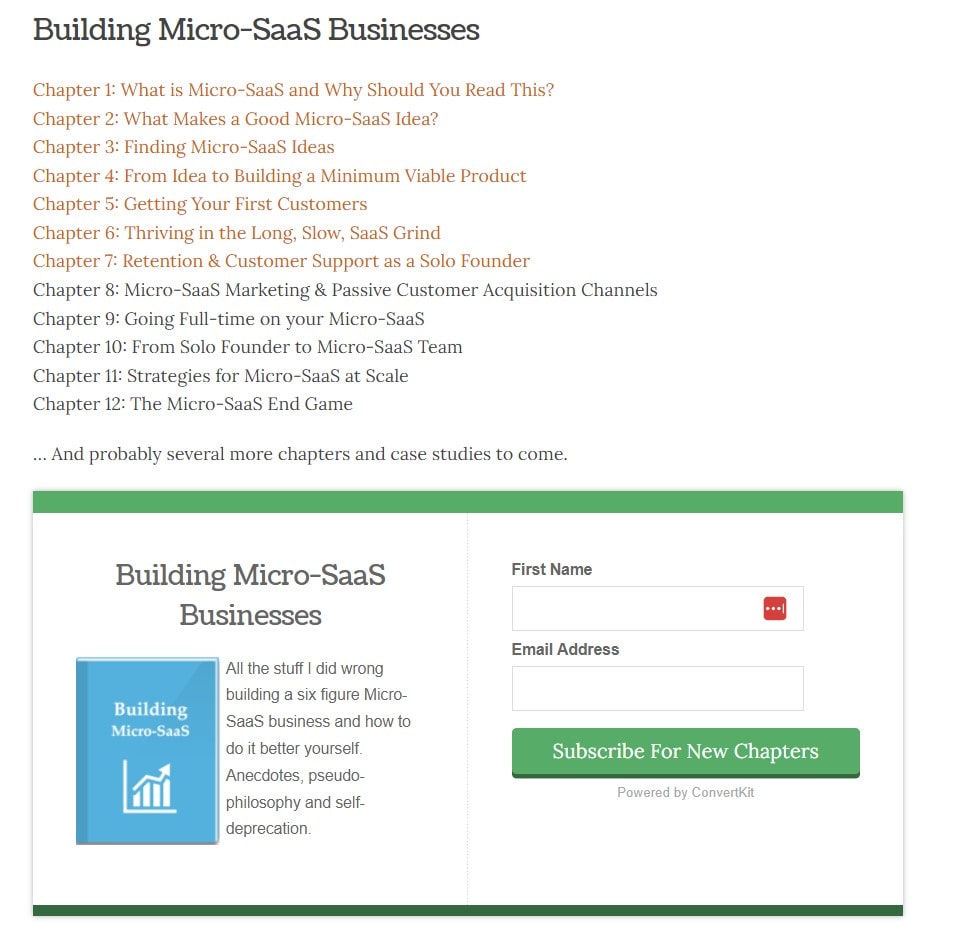
Building Micro-SaaS Businesses by Tyler Tringas is a personal and engaging guide to building and growing your own profitable SaaS product.
What made this free eBook a gem for me is that Tringas wrote it based on his personal experience as someone who founded the first-known micro-SaaS.
He dove into the micro-SaaS business when he started his side project Storemapper.
Therefore, he knows what he’s saying, and the eBook isn’t full of baseless assumptions or cliché tips.
Also, he prioritized and focused on discussing how to create a sustainable business.
Besides that, this eBook is accessible and easy to digest.
You can read the first seven chapters as an article series and join his email list if you want to receive the rest.
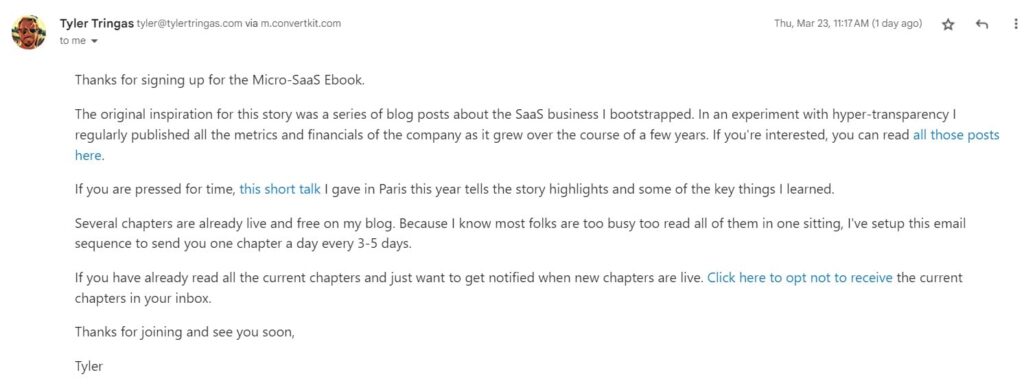
The only thing to note is that it was written seven years ago, and I haven’t seen any updates since then.
But, as I read the material, I realized that what Tringas wrote still holds up and remains relevant today.
It would be nice to add current practices, update links, and provide more recent tools that we can use, though.
Nonetheless, there were specific chapters I recommend reading: chapters five and six.
In Chapter 5, he talked about how to get your first paying users, which is a relatable challenge for any micro-SaaS business owner.
I love how he shared strategies that worked for him and pointed out those that didn’t.
Meanwhile, Chapter 6 was a refreshing topic I didn’t expect.
Here, Tringas emphasized the importance of going for a slow but steady way of building a profitable business (instead of a fast but directionless one).
He didn’t romanticize the idea of hustling 24/7.
In fact, he admitted that he could only work on his software project for 15-20 hours monthly.
But he used his time wisely, giving him the ability to grow his own bootstrapped micro-SaaS company.
This gives hope to those working full-time jobs.
2. The Micro SaaS Handbook by Rick Blyth
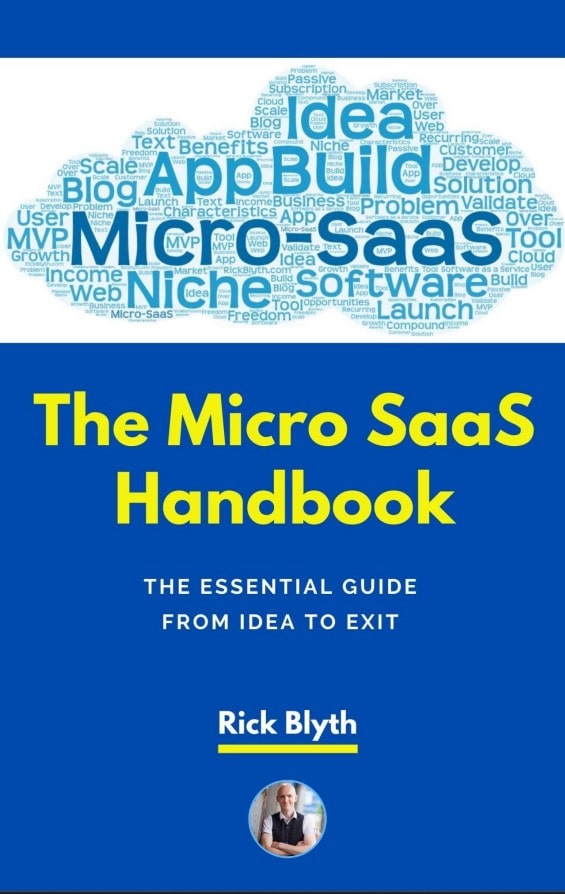
Moving on to another tremendous free eBook.
The Micro SaaS Handbook is a downloadable guide spanning over 100 pages.
It’s an ideal resource if you want to build financial stability through profitable software products.
The micro-SaaS eBook discusses everything you need to know about micro-SaaS, from its benefits and challenges to things to consider when selling your business.
It also talks about how you can choose the right niche and how to expand your revenue.
What I like about it is that Blyth does an incredible job of explaining the concept of micro-SaaS in a detailed yet concise manner.
For instance, besides the definition, he provides examples of micro-SaaS apps in different categories, like mobile apps and desktop apps.
But what impressed me the most was his delivery, writing style, and structure.
He was very systematic in his approach without failing to make it engaging.
Moreover, he provided bullet points as an outline for each chapter so that you’re aware of what topics will be discussed right off the bat.
Furthermore, he used images to break up blocks of text, making the information easier to grasp.
The conclusion in each chapter also serves as a handy summary for those who want to refresh what they’ve read.
I liked the eBook, but some of the chapters that stood out most to me were the fourth and eleventh.
Chapter 4 talks about finding a solid micro-SaaS niche.
As a freelancer, I know how hard it is to pick the right niche to go for.
There are so many things to consider, and you have to do in-depth research before pushing through with your chosen niche.
Even with that, however, Blyth made it somehow easier by highlighting the core characteristics of a profitable and sustainable niche.
He also added personal insights from his experience with his Merch Wizard Chrome extension.
On the other hand, Chapter 11 is a great read for those who have seen growth and may be considering selling their software.
Blyth shared his experience of doing that, too, on his own terms and price.
He also discussed the factors to consider when selling your own micro-SaaS product.
While this chapter may be more advanced than the others, it’s chock-full of valuable information you can use in the future.
All in all, this eBook caters to different stages of micro-SaaS entrepreneurship.
And because it’s combined with the author’s first-hand experience, you can rest assured that the nuggets of wisdom he shared will be helpful to your own journey.
3. Micro-SaaS Guide: Build a Profitable Business in 2023 by Preetam Nath
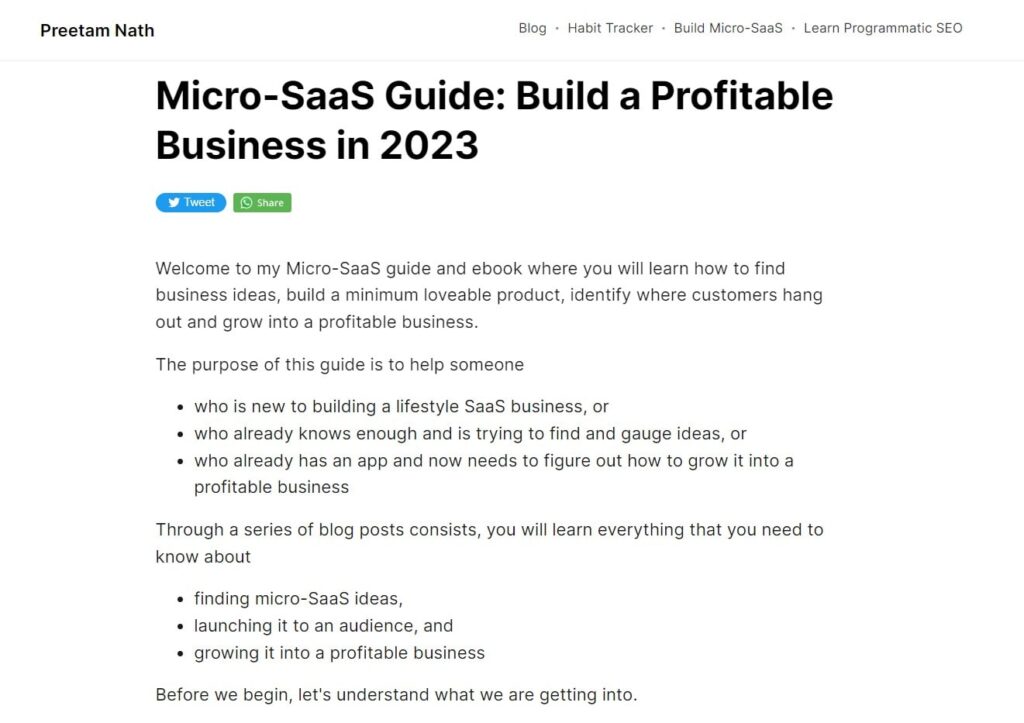
After exploring the previous eBooks, I came across this resource material as well.
Like the two above, Micro-SaaS Guide: Build a Profitable Business in 2023 is a free eBook accessible to anyone.
It walks you through the stages of starting, promoting, and selling your micro-SaaS business.
What caught my attention about it was that it felt similar to Tringas’ micro-SaaS eBook in terms of some of the topics they covered and the content.
And apparently, it was because Nath derived his inspiration from the said book.
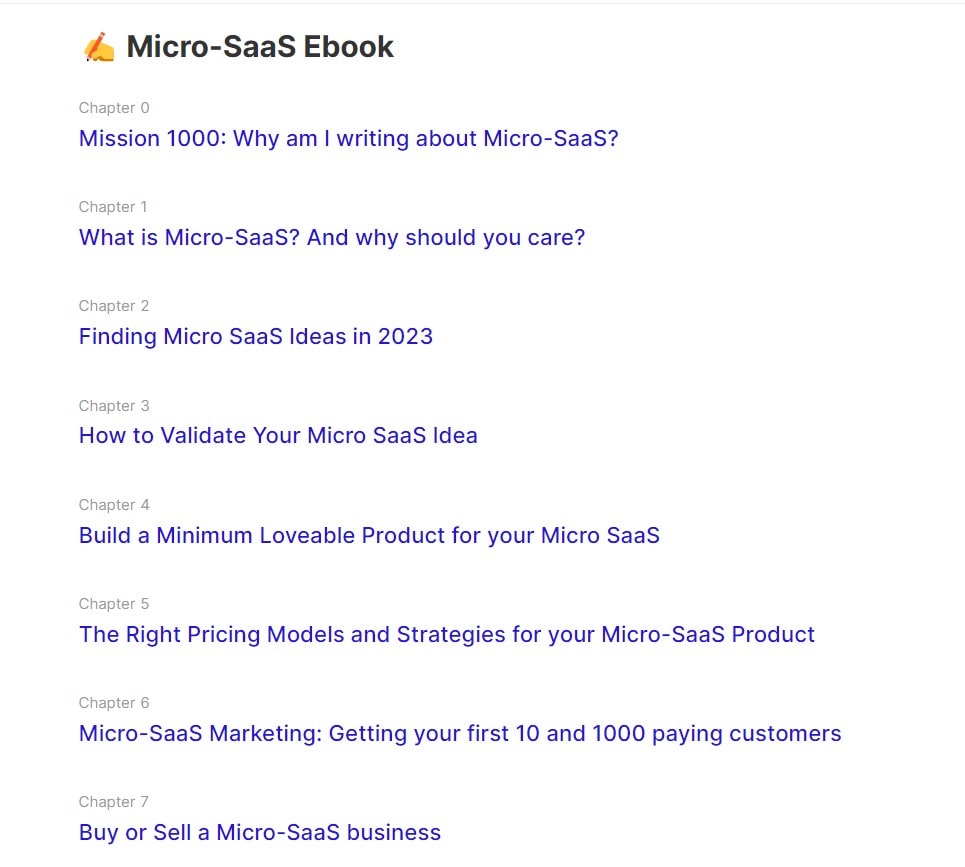
However, one advantage of his work is that it’s more concise and updated.
For example, while both authors discussed micro-SaaS ideas and the qualities of a good business, Nath managed to cover these topics in one chapter rather than two.
This results in shorter and more digestible content.
Additionally, he added his insights along the way, introducing new ideas.
For instance, in Chapter 1, he discussed the notion of “Ramen Profitability.”
We usually think of huge income or revenue when discussing whether a business is stable.
But, according to him, you can tell your start-up software company is at a good level if it can cover your food and living expenses.
It gives us a new perspective to look at, and I really liked that.
Another fresh micro-SaaS idea he mentioned was the Minimum Lovable Product (MLP).
I don’t want to bore you with too many details, but it’s an alternative to Minimum Viable Product (MVP) and focuses on a more particular solution to a specific problem.
Although he has written a new blog post mentioning that it didn’t work as he initially thought, MLP was still a great approach to learn.
Overall, Nath’s guide is a great read for those looking for a shorter, more up-to-date resource than Tyler’s work.
4. Zero to Founder: The Micro SaaS Builder’s Handbook by Upen V.
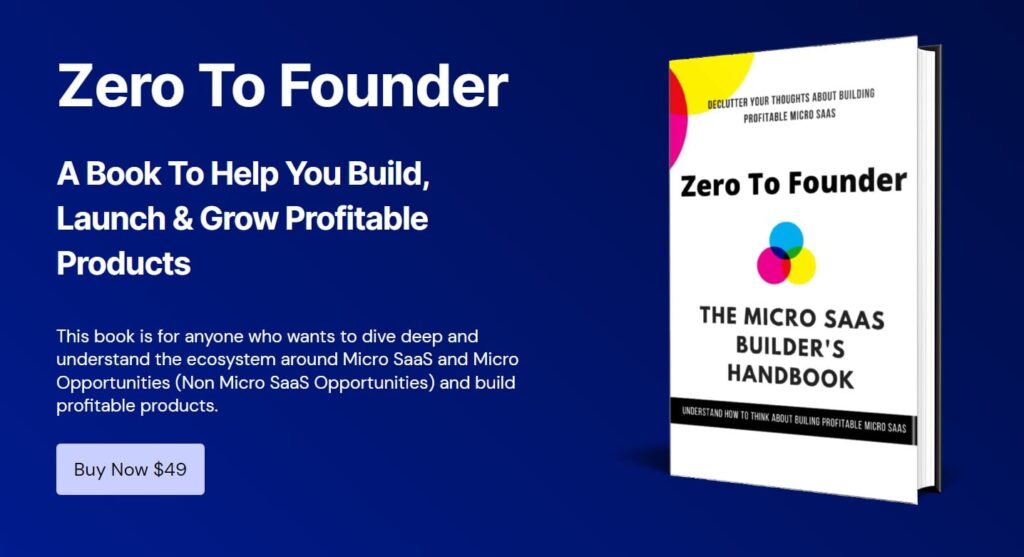
Let’s continue our journey into the micro-SaaS world with the fourth book.
I hope you’re still with me because Zero to Founder: The Micro SaaS Builder’s Handbook is be a special one.
What sets this handbook apart is the author’s evident passion for learning more about the micro niche.
You can see it in the way he arranged the topics and how he shared insights, data points, actionable advice, and step-by-step guidance.
Beyond the basics, this handbook dives deep into the micro-SaaS ecosystem and business management.
It talks about:
- SEO practices;
- Different payment platforms;
- Micro-SaaS technical aspects;
- Non-SaaS marketing opportunities;
- Business registration;
- Accounting and taxes;
- And so much more.
That’s why this comprehensive guide is not free. Despite that, its $49 price tag is well-justified.
Additionally, the Notion format allows for an organized, FAQ-style presentation that makes it easier for you to find the information you need.
Here’s what I’m talking about.
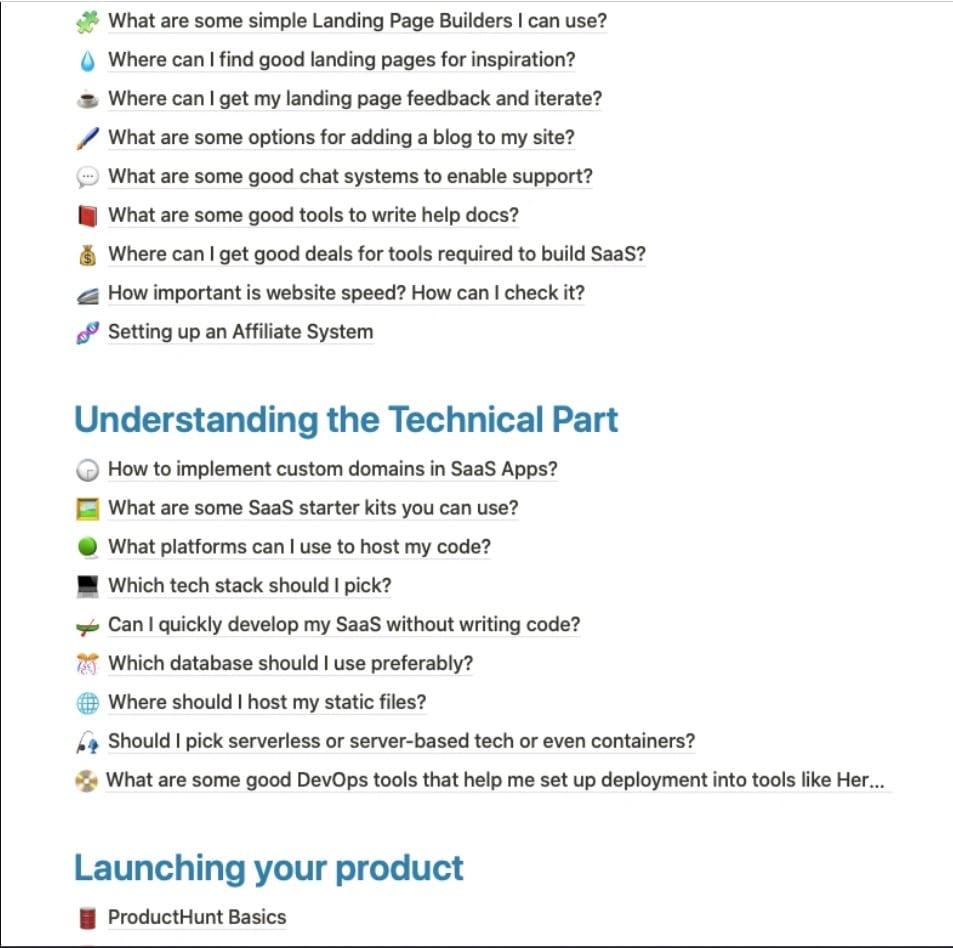
That’s honestly a big-brain move, considering that Upen provides answers to over 200 questions.
Some of the sections that stood out for me were the chapters on SEO and the legal side of running a business.
I was impressed by how he highlighted the importance of SEO in driving traffic to micro-SaaS businesses.
He provided valuable insights into creating content and gave tool recommendations and tips.
Meanwhile, the legal topic is something that I really hoped to see in the other eBooks I’ve read.
It’s not discussed much, but it’s crucial in maintaining an established and sustainable business.
This is where Upen’s eBook differs from the other micro-SaaS eBooks, as it covers company registration, taxes, privacy policies, and more.
So, if you aim to grow your micro-SaaS and are here for the long run, this handbook is a must-have.
5. How to Start a SaaS Company: A Beginner’s Guide by Ahmed Shabib and Sunil Kumar
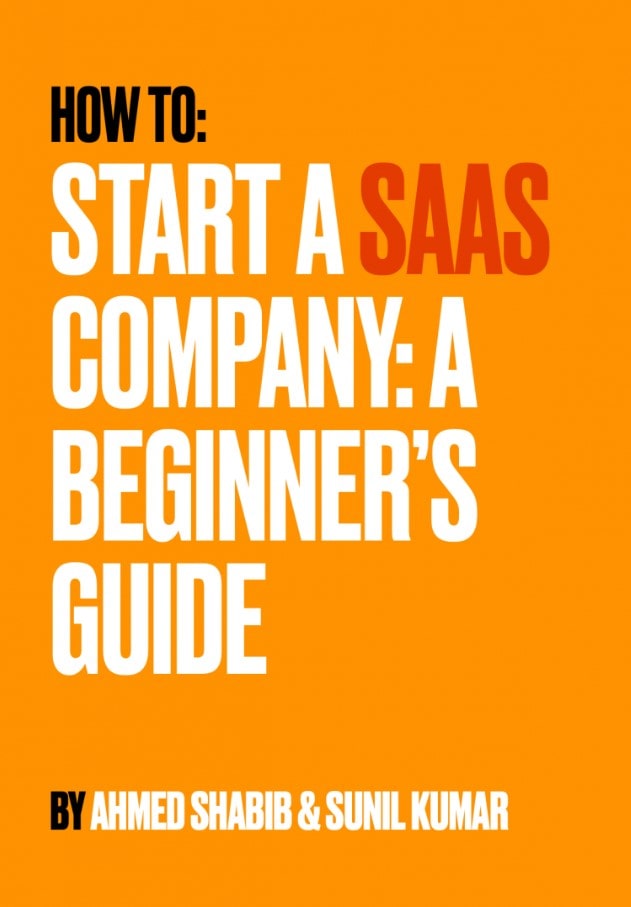
As we round out the list of the best Micro-SaaS eBooks, we end it with a resource by seasoned entrepreneurs.
The success of Shabib and Kumar’s business ideas is a great evidence of their expertise.
If you’re not familiar with them, they’re the masterminds behind ShipThis.
And if you want to know how they established these companies, it’s best to start with How to Start a SaaS Company: A Beginner’s Guide.
Their guide covers everything you need to run a business, build a strong team, and raise capital.
This one isn’t free but is more affordable at $19.
What sets it apart is the authors’ deep understanding of building business at a minimal cost.
They even provide a spreadsheet to help you monitor expenses and revenue.
This shows the authors’ commitment to helping readers establish a cost-effective business.
Another thing I like about this eBook is the emphasis on market research before formulating business ideas.
Most start-ups fail because they either target the wrong market or don’t do enough research on what their audience truly needs.
That’s why it’s refreshing to see this crucial topic discussed right from the start in this book.
Final Thoughts on Micro-SaaS eBooks
Now that we’ve laid down our best recommendations, which micro-SaaS eBook resonates with you most?
The list above consists of great books, so you’ll surely gain valuable insights from each of them.
If you need more valuable resources related to SaaS, you may check out our blog posts.
Feel free also to contact us if you need assistance building your software business.
Our team at Symalite Labs can help you at any stage of your Micro-SaaS journey.
Some of our projects include GroupLeads, Chatsilo, Orrderly and VidScout.

